Creating and writing ±«Óãtv from ±«Óãtv
Chris Fewtrell and Simon Crowther
Writers
±«Óãtv from ±«Óãtv starring Johnny Vegas began last Friday on ±«Óãtv One at 9.30pm. We caught up with its writers, Chris Fewtrell and Simon Crowther, to find out about their writing careers (including Coronation Street), their comedy heroes and creating their new show.
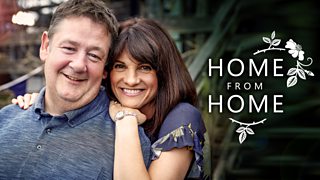
We know you best as writers on . How did you get into screenwriting in the first place and what was your path to writing for Corrie?
Chris Fewtrell: I began writing at secondary school, inspired by a terrific English and Drama teacher, like so many people. I wrote for a youth drama group, and continued writing sketches and so on at University. When I was 21, at Granada TV picked up an idea for a comedy and this was my first paid work, although it never got out of the development phase.
On leaving University, it was difficult to make writing pay as a full-time career, so I became a journalist at the ±«Óãtv. But aged 25, I decided to take one more shot at writing full-time. I got a gig with a Sky show called and I haven’t been out of work since - note to Fate, that’s not temptation talking! I worked as a jobbing writer on a range of shows, , , , to name a few, before Tony Wood became producer at Corrie and offered me a job in 2004. As my wife was pregnant with our first child, it was very much the right job at the right time and, fourteen years on, I’m still happy to be there as it’s a show that’s always prized humour and given its writers the latitude to inject something of their own, distinctive voice.
Simon Crowther: I started off trying to sell film comedies – as well as having a brief stint as a TV commercials director, but long running dramas offer a good opportunity to get your work onscreen regularly, and if you’re any good at it you make sure your own voice can be heard. I like stuff best when it feels real. If you’ve had an argument with your partner, use it in a scene, the chances are it‘ll ring true. Television writing has so many lazy and familiar trapdoors it’s important to avoid. Soap opera is especially susceptible to these because it’s written and produced so fast – but it’s still capable of being rich, and funny, and moving. These are characters who’ve been inside people’s living rooms for years, so they matter. Twelve years ago I was writing for another show when the then Coronation Street producer read a comedy I’d written and invited me onto the writing team. I’ve enjoyed it ever since.
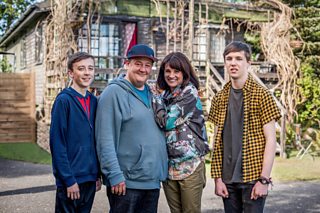
The Hackett family (Little Neil (HARVEY CHAISTY), Neil (JOHNNY VEGAS), Fiona (NIKY WARDLEY), Garth (OSCAR KENNEDY)(Image Credit: ±«Óãtv/James Stack)
Have you generally written alone or in a writing partnership? Do you think partnerships work particularly well for Comedy writing and how did this one come about?
CF: For most of my career, I’ve written solo. I met Simon when he joined Coronation Street in 2006. We hit it off immediately and began writing story pitches together. We then co-wrote a Corrie spin-off called (still available at all good DVD outlets), heading out to Romania for filming. We found the collaborative process reasonably agreeable, inflicting only minor flesh wounds on one another, so we decided we’d try to develop original projects, while obviously continuing to write for Corrie separately. We both felt our heart and our strengths lay in comedy and so that’s where we’ve concentrated our efforts.
It’s often said that comedy lends itself to collaboration and I definitely believe that to be true. It’s so much easier to have confidence in a gag if you tried it out on a (relatively) discerning audience! Obviously, you need a strong relationship to be able to tell one another when a joke or suggestion doesn’t work - setting out to a write a comedy with someone is one of the very fastest ways to destroy a beautiful friendship. Fortunately, Simon and I know one another well enough to be able to be honest, to the point of brutality.
SC: Most things I’ve written – TV, stage plays, radio and so on - I’ve written on my own. The first thing I wrote with Chris was a sit-com pilot set in a Sunday league football team’s changing room. We’ve developed a few TV dramas together, but generally speaking, writing in a pair lends itself to comedy. Most of the time you’re hoping to top the joke with the next line of dialogue, so sitting together helps, acting it out a bit, making each other laugh. If you’re honest with each other, the bad ideas are killed off early, before they make it to the page. We know when we’re tired. We know when it’s not happening. It’s also important to remain relatively cordial. We’ve had one or two flare ups, but that’s healthy.

The Dillons (Robert (ADAM JAMES), Penny (EMILIA FOX)(Image credit: ±«Óãtv/James Stack)
How did ±«Óãtv from ±«Óãtv happen? How did you get the idea for the 'sit' in the sitcom and what was the development and commissioning process?
CF: Simon and I both had caravans in North Wales, and we thought this was a comedically rich arena. It struck us as one of the few precincts where people from all walks of life live cheek by jowl. We both have families and know the unique stresses and strains that holidays can place upon domestic life, and that reality rarely matches up to the kind of ideal that is sold to you in the brochures. As dads, we also know that feeling, the sting of falling short in your pursuit of that elusive ‘good time’. Such feelings of frustration and inadequacy are only accentuated if it seems everyone else is having a ball, as poor Neil does when looking across the way at his gilded neighbour Robert. He really couldn’t have chosen a worse yardstick! Anyway, we brought the project to producer , who has been a wonderful, tireless champion from day one. '±«Óãtv From ±«Óãtv’ would never have made the screen, first as a pilot and then a series, without her skill, energy and tenacity. We’re also indebted to , , and for the faith they’ve shown in us.
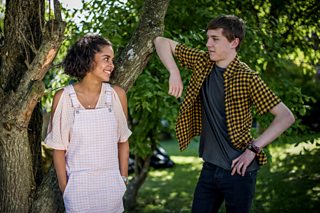
Petra (OLIVE GRAY), Garth (OSCAR KENNEDY)(Image Credit: ±«Óãtv/James Stack)
Why do you think sitcom is such a difficult genre to get right but also probably the one that produces the shows that people love and remember the most? Would you describe ±«Óãtv from ±«Óãtv as a sitcom or a comedy drama? (Do these labels even matter?)
CF: Our brief, before we wrote a word, was to produce a mainstream sitcom suitable for all the family, which has been something of a Holy Grail for both the main channels. And it is difficult to do because, by necessarily eschewing anything too edgy, tricksy or overly cynical, you’re immediately placing yourself in the critical firing line. Kicking a sitcom at the earliest possible opportunity, when it’s barely through the door, is a national sport. Shows like and took entire series to bed in, now people are gleefully donning their black caps on Twitter after ten minutes! So yes, it is a difficult daunting task when you sit down to write a broad appeal show as, all too often, popularity and critical acclaim don’t go hand in hand.
We set out to write a show that could hopefully buck that trend, but wanted to produce a genuine sitcom, where the laughs arose from the situation and context, as opposed to occasionally desperate devices such as wordplay. Shows like Detectorists that breathe, which aren’t slave to the four gags a page model, were our benchmarks, work that has confidence in the humour that will arise from story and characterisation. So I think it’s definitely a sitcom, maybe even more so than those shows that might rely on forced gags rather than anything intrinsic to the situation. As for labels, the only one that really matters is entertainment. We want to give viewers some respite from a very troubled world. Half an hour of warmth, wonderful scenery and, hopefully, a bit of wit.
SC: I hope it’s a sit-com, but the definitions are quite fluid. Is a sit-com? Does it matter? They need to be funny. But even then, a sit-com can be many different things. It can be warm and full of pathos, like The Royle Family, or . It can be literate and completely unsentimental, like . Or it might feel improvisational, like The Office, , and everything they gave birth to. ±«Óãtv From ±«Óãtv is obviously a mainstream family comedy, with a set of conventions we had to bear in mind. A good sit-com episode should be like the perfect one-act play, with a strong and simple story. Look at the pilot, for example. The most important thing of all of course is character. Without believable, flawed, funny characters you’re finished, and it’s these characters, and the actors who play them, that make certain sit-coms stick.
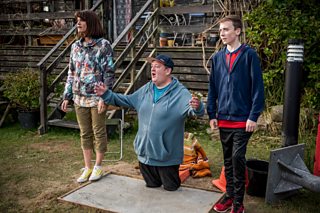
Fiona (NIKY WARDLEY), Neil (JOHNNY VEGAS), Little Neil (HARVEY CHAISTY)(Image Credit: ±«Óãtv/James Stack)
±«Óãtv from ±«Óãtv began as a pilot episode which went out in 2016. How did you develop the story from the pilot? Did you learn anything that particularly worked or didn't work from the pilot that needed changing?
CF: The biggest change from the pilot, aside from a little recasting, fell into our laps. We were happy with our themes - described above - but the class component was given a whole new urgency by Brexit. By the very clear divide that had opened up not so much between North and South as between Metropolitan and Provincial. It was an entire coincidence that Neil was from Stoke-on-Trent, dubbed the 'Brexit Capital of England', but no coincidence that it was the sort of place that has known hard times, that has struggled to get its voice heard as the south-east in particular has developed a growing economic and cultural stranglehold on the rest of the country.
The whole first episode, and more particularly Neil’s march into the setting concrete, was intended as a non-partisan allegory for Brexit. The script is littered with allusions to the EU - Neil being part of a community whether he likes it or not, being thwarted by faceless bureaucrats, references to him "taking back control". His cri de coeur as he sinks into the cement, “I might not have a fancy job, or a degree but I matter, and I will be heard!” was intended to be the voice of the marginalised blue collar men and women who felt ignored and voted accordingly in the referendum. Neil ended up stuck with the decision he made in protest, but then again the mast did get relocated. It’s for the viewer to decide whether he was right or wrong, we offer no opinion either way! So, although superficially, ±«Óãtv From ±«Óãtv might look like just another class based comedy, there’s more going on than it may first appear...
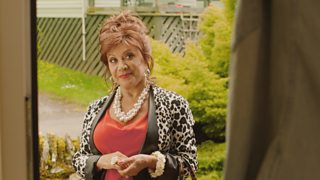
Mercy (ELAINE PAIGE)(Image Credit: ±«Óãtv)
On a long-running continuing drama like Corrie you are working with a storylining team and mostly already existing characters that you haven't created. What's it like creating your own original characters - do you write for the actors (eg ) or are the characters created first followed by casting actors who are right for the role?
CF: We wrote the original script without any particular actor in mind, but became very excited when Johnny was linked with the project. We were fans already but also felt he was perfect for the role. He’s an everyman viewers can relate to, while possessing the flair for righteous anarchy that’s at the very heart of Neil Hackett’s character. Neil will conform to a degree, but if he feels he’s being sold short or slighted, he will go nuclear, and very quickly! In that sense, although it might seem a peculiar analogy, we wanted a touch of about him, with Neil eminently capable of giving "a damn good thrashing" to his car! In writing the series, it was definitely easier to have the actors’ voices in mind, but the characters were very firmly drawn prior to casting. We were delighted to get the ensemble we did, with Casting doing a wonderful job for us. And landing Elaine Paige was the cherry on the cake.
SC: Johnny came on board fairly early, so even though we’d started writing Neil Hackett, he soon became imbued with Johnny’s many qualities – his voice, his ability to go off on one… He brought an everyman quality to the role that made Neil more loveable. That allows you to take the character further in terms of their absurd or extreme behaviour. In terms of how you dream these people up? For us it comes out of conversation – lots and lots of talking. We throw in plenty of autobiographical frustrations – again, if you’ve felt something, no doubt other people will have too. And we work very, very hard. But even then, there’s no science to it. Something we thought would kill might not raise a laugh, and vice versa

The Dillons superior cabin (Image Credit: ±«Óãtv/James Stack)
Thinking of Coronation Street and also writers and performers like Caroline Aherne, Victoria Wood, Peter Kay etc. do you think there's a particular northern English 'voice' in comedy? Why do you think this is?
CF: I think there’s definitely a northern comic sensibility, but this a tricky question for me to answer as I’m from the Midlands, and still live there now! I think its distinctiveness might reside in a lack of pretension, a certain warmth and familiarity that you often seem to find in northern comic performers, an aversion to the ‘slick’. It might be reflective of the wider culture, deriving from close-knit working class communities, united in trying to find the funny side in adversity… but then again, I’m no sociologist and I’m wary of pedalling generalities and clichés!
SC: I grew up in South Wales, but much of my family is from Yorkshire, and the difference was always noticeable to me. There’s a warmth to the north of England, a generosity of spirit, an unpretentiousness that no doubt relates to the general economic divide. But ‘laughing through hardship’ might just be a cliché. Certainly no comedian can rely on ‘northernness’ – it isn’t funny in itself. is funny. is funny. But their voices are very different.
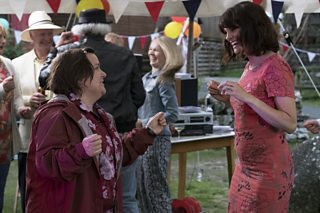
Sykes (SUSAN CALMAN), Fiona (NIKY WARDLEY)(Image Credit: ±«Óãtv/Vishal Sharma)
Who are your comedy idols or the shows you’d want to take to watch on a Desert Island?
CF: Where do I start? , , , , , , , , , , , , , , , . And there are undoubtedly loads of great performers and shows I’ve missed out. Trapped on a desert island, I’d probably take Steptoe and Curb, but any of those listed would be guaranteed to raise a laugh, however desperate my situation.
SC: , , , , , , , , – so all of and . first series. . , , , , , , , I could go on and on. I’d probably handpick episodes from all the above – everybody on that list has had an off day.

Writers Chris Fewtrell (l) and Simon Crowther (r) on the first day of the ±«Óãtv from ±«Óãtv shoot
Have you been given any advice about writing that you’ve found particularly useful and that has stayed with you?
CF: If you like ‘±«Óãtv From ±«Óãtv’, then it’s “Write about worlds you know". If you don’t like ‘±«Óãtv From ±«Óãtv’, then it’s “Don’t give up the day job!"
SC: Yes, lots and lots. Some of it has been imparted by other writers, some you come across while reading, but most of it you learn from doing, and redoing. Pare scripts down as much as you can – cut, cut, cut. Use only what you need. Make sure your silly comedy is actually about something. Read lots of plays, and novels. Go to the cinema and the theatre. Write every day. All pretty obvious stuff. I was lucky enough to know , and one of the first things he said to me about scriptwriting was “Forget about art.” I also love ’s advice. When you’re stuck in the middle of a sit-com scene, ask yourself “What would really happen?” That sounds so simple, but it’s so easy to forget.
±«Óãtv from ±«Óãtv continues on Fridays at 9.30pm on ±«Óãtv One. Catch up on ±«Óãtv iPlayer
